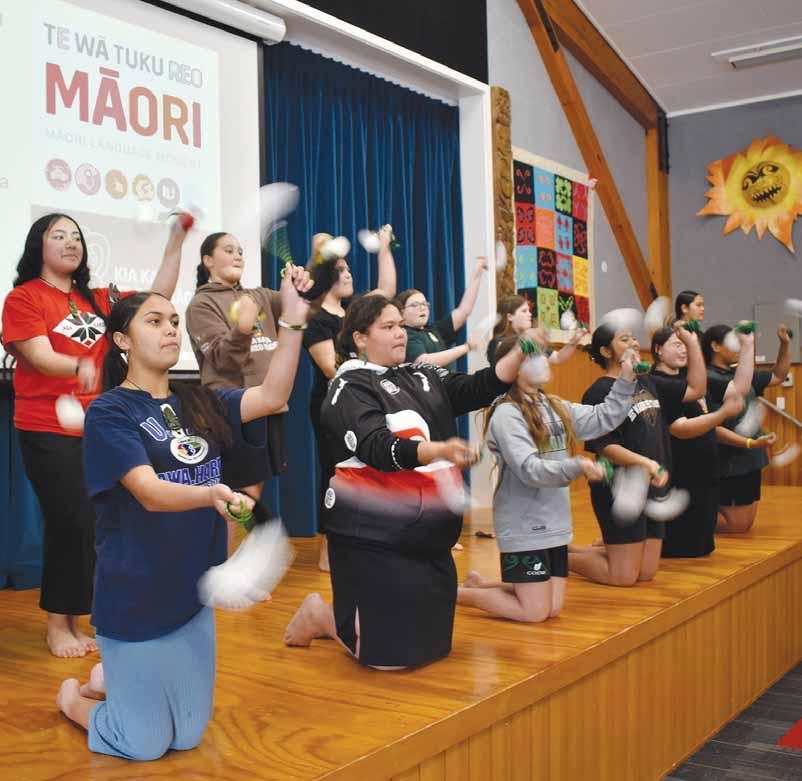

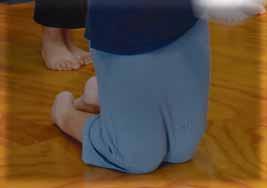









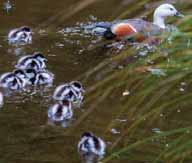
How to reach us
Phone (04) 587 1660
Address 23 Broderick Rd, Johnsonville
P.O. Box 38-776, WMC 5045
Fax (04) 587 1661
ONLINE: www.wsn.co.nz
REPORTER
Frank Neill
wainui@wsn.co.nz
027 490 3916














Phone (04) 587 1660
Address 23 Broderick Rd, Johnsonville
P.O. Box 38-776, WMC 5045
Fax (04) 587 1661
ONLINE: www.wsn.co.nz
REPORTER
Frank Neill
wainui@wsn.co.nz
027 490 3916

Continued from page 1
As well as marking Te Wiki o te Reo M ori, the students were also performing at noon, marking a very special moment in the promotion of te Reo.

Noon on 14 September marked the very moment the M ori Language Petition was presented to Parliament in 1972.
The petition was presented on New Zealand’s first M ori Language Day. Three years later, what was one day became what we now know as Te Wiki o te Reo M ori.
SALES
Les Whiteside
les@wsn.co.nz
021 360 008
Fifteen years after the petition was presented to Parliament te Reo M ori was made an official language of Aotearoa New Zealand.
The students’ outstanding performance “has definitely been my highlight of this Te Wiki o te Reo M ori week,”
a poi.”
NATIONAL
SALES
Sam Barnes


sam@wsn.co.nz 021 109 4406


CLASSIFIED SALES classifieds@wsn.co.nz
Sapphire Murray, kaiako (teacher) of Te Kahui T mariki told the students following the performance.
The students decided on the focus for this year’s performance, Ms Murray told the “Wainuiomata News”.
“Each year we always come up with something we can do to promote Te Wiki o te Reo M ori.

“This year we put out a voting system to see what the kids wanted to do. They came back that this school wanted to do
Every student then made their own poi and came to the practices for this big event.
Te Wiki o te Reo M ori is important in Wainuiomata, the school’s Tumuaki (Principal)
Craig Sharp said.
“This is where part of the languague revitalisation started.”
Wainuiomata, Mr Sharp noted, is where New Zealand’s first Te K hanga Reo opened its doors in April 1972 – more than 41 years ago.
The Pukeatua K hanga Reo was established to ensure that a generation of tamariki would
grow up speaking their language.
At the time fewer than 5% of M ori tamariki were fluent in Te Reo.
M ori kaumatua gathered to take responsibility for ensuring that Te Reo would survive.
“I think its important that we carry on this tradition here,” Mr Sharp said.


“We stand on the shoulders of giants in this community.”
Among those giants were three people involved in establishing the Pukeatua K hanga Reo – Dame Iritana Tawhiwhirangi, Frances Williams and
Jean Puketapu.
Since the establishment of the Pukeatua K hanga Reo not only have k hanga reo been established throughout New Zealand, so also have classes in schools providing total immersion in Te Reo as well as schools that provide total immersion throughout their programme.
Wainuiomata Intermediate School’s 14 September performance is not over.
The event was captured on video, and this video is available on the ReoM ori website, www.reomaori.co.nz.

Wainuiomata firefighters had an incredibly busy day when high winds damaged scores of properties in the valley last Sunday 17 September.
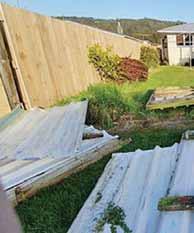
The Fire birgade responded to more than 50 calls, Wainuiomata’s Chief Fire Officer Ewen Heron told the “Wainuiomata News”.
“We normally do around 250 callouts in a year,” Ewen says. “She was pretty full on.” Sunday’s total of more than 50 callouts is among the highest for the brigade in one day.


The brigade responded to a similar number of calls when floods hit Wainuiomata in 2004.
Most of Sunday’s calls were from people whose fences or trees had blown down, and there were also some calls because rooves had been damaged by the wind.
The only serious call duirng the day was lodged after a house lost part of its roof.

There was also a car port that was threatending to take off in the high wind and had to be stabilised.
When answering calls, the brigade first evaluates the situation. It then looks to temporarily secure and stabilise the situation, as well as removing anything that is likely to take off in the wind.
Two appliances from Seaview also came to Wainuiomata on Sunday to help with the wind damage.
“It was lucky it was in the weekend when everybody was here,” Ewen says. That is because the brigade has a good number of firefighters available outside of work hours.

The brigade is, however, in need of firefighters during the working week.
“If you’re a team player, would like to learn new skills and make your community safer, we would love to hear from you,” Ewen says.


People interested in finding out more can contact Mr Heron on 021 483 111 or visit the volunteering page on Fire and Emergency’s website, https://www.fireandemergency.nz/ volunteering/


Last Sunday’s mahi by the Wainuiomata Volunteer Fire Brigade has received accolades on Facebook.
“Thank you for all your efforts today,” Ryan Imray posted on Facebook.
“Totally agree,” Christopher Whitcombe wrote.

“Very grateful for the work that you all do for our community. And a thank you also to all the volunteers’ families who helped make this possible each and every day.”
“We are so blessed,” Denise Graham wrote.


One of the fences blown down during Sunday’s strong winds
“I was just about to acknowledge their mahi too. What a great community we live in.”
“Thank you to all our volunteers,” Vanessa Timutimu wrote. “It has felt like the siren has been non stop.”
And these are just four of the many posts congratulating the Fire Brigade.

is like a bunch of choco-lates
– you never know what you’re going to get.JC Broose Run Forest run. Martin Peck Frankly my dear, I don’t give a damn.

Urgent action is needed to face serious risks and challenges in the Wellington region’s water network, local Mayors, Councillors and mana whenua agree..


















K rero Mai; an app that allows users to discover places w here they can immerse themselves in te reo M ori, was launched during Te Wiki o te Reo M ori, M ori Language week.

K rero Mai can be accessed on a phone, computer, tablet, or via their website, and is free for both users and those who want to list their business.
The app has been created by Matt Browning together with K tihi Reo Consultants.
Like many, Matt found making k rero M ori part of his everyday life difficult.
“I thought, what if I immersed myself deliberately,” he says.
“How do I do that, how do I know where people are? If I can find other people who I can speak with and are happy with me practicing,

then great.
“If I go and get coffee every day, then why don’t I get coffee from a place where I know I can speak te reo M ori and they can speak back to me,” Matt says.
“It’s a beautiful language.
“It felt like the right thing to do to be able to connect with friends and be more a part of the community.
“For me, as a P keh , I wanted to connect and pay respect to tangata whenua,” he says.
Matt currently studies te reo M ori through K tihi Reo Consultants and works with them to make sure all the te reo M ori is correct on K rero Mai and they offer their resources and services through it.
To find out more about K rero Mai or register your business, visit www.koreromai.nz.

The region is facing significant and increasing risk of water shortages and providing a reliable water supply for their communities in future years.
"Water use in the Wellington metropolitan region is at an all-time high and is increasing every year," says Campbell Barry, the Chair of the Wellington Water Committee, who called a Water Shortage Summit on 11 September.
"We all know that there is a growing number of leaks due to an aging network and historical underinvestment,” Campbell says.
“We are also seeing higher water use generally and a growing population in the region that is increasing the demands for water and putting more pressure on our water services.
"Our drinking water system has a finite capacity, and we can only treat and supply a set amount of water on any given day. We need to do more to make sure we can continue to reliably provide our residents with enough water.
"All those in attendance [over 60 elected officials and mana whenua] agree that the situation is urgent and we need to act now."
Three key actions were recommended by Wellington Water to
tackle the issue. These were: continue with increased investment into finding and fixing leaks, managing water loss, and replacing old infrastructure; investment in universal smart water meters across the metropolitan Wellington region; and build another storage lake.
"The overwhelming majority agreed that these recommendations be taken to each of the council’s Long Term Plans for decision," Campbell says.
"Obviously, the Long Term Plans themselves will need to undergo public consultation, but if accepted, this investment will be the first time all councils have taken a regionally coordinated approach to addressing water loss."
Wellington Water’s Chief Executive Tonia Haskell has welcomed the direction from today’s summit.
"Providing a reliable supply of drinking water is an essential service we provide our communities," Tonia says.
"We are doing all we can at Wellington Water to manage the network in an efficient and effective way and to reduce water loss and leaks. But it’s not enough to combat what is a complex and multi-generational issue that requires long-term investment and solutions.
"Today’s direction from the summit provides us, as the region’s water services provider, with a clear steer.

In the meantime, we will continue finding and fixing the biggest leaks."

Both Campbell and Tonia note that these mitigations are for future years and won’t have an impact on the water shortage risk the region is still facing this year if we experience an average summer with no significant rainfall.




"We have asked Wellington Water to do all it can to reduce this year’s risk through their current programme of work.
“They are also working with our councils to be prepared to respond if we face a situation where we are unable to supply enough water to meet consumer usage and demand," Campbell says.
"On Sunday 24 September the whole region will be on Level 1 Water Restrictions, as it does every year. This means we all need to start to be more aware of our water use and make changes to our behaviour. Using less now means we will have more water available for when the weather starts to get really dry.
"Wellington Water will be monitoring the situation closely and providing our councils with advice on water usage and whether or not the region needs to move into tighter restrictions as we progress through the summer."
More information on water restrictions and water saving tips can be found on the Wellington Water website.










 By Frank Neill
By Frank Neill
Funding is available for projects that:

 By Frank Neill
By Frank Neill
The Wainuiomata Croquet Club will celebrate its 30th anniversary at its clubrooms on 4 October.


Four foundation members of the club will be attending the birthday celebration.
Joyce Jones, Betty Nicholson, Margaret Engelbreten and Janice Harrington were original members and are still active in the club today helping organise events and

CHEMIST

(04) 564 8618



20-21 Queen Street, Wainuiomata. dispensary@clives.co.nz www.clives.co.nz


fundraising. Club Patron, Ray Wallace ONZM says the club has always had a family feel to it and that’s been its success.

To have four original members still working hard for the club speaksvolumes of the high calibre members.
Along with all the club fundraising, garage sales and cake stalls the club has had support from the Hutt City Council and Lottery
Grants which have helped build a great facility.
The club “has a very proud history and it is a club that I have been proud to be associated with,” Ray says.
As well as celebrating its 30th anniversary, the club will also open its 2023-24 season on 4 October.
The club is looking for new members both young and old. For more information email croquetwainui@gmail.com.
Funding is available to support Wainuiomata participation in community arts and culture projects. The Creative Communities Scheme funding is provided by Creative Communities NZ and is aimed at supporting community groups and i ndividuals to contribute to the creative life of Hutt City residents and visitors. Applications for the Creative Communities Fund are now open and close Saturday 14 October.
12 months of funding being and mainly benefit people living in Lower Hutt and localfunding from Creative New Zealand for the same purpose. More information is at hutt. city/communityfunding


More than half a million New Zealanders have been victims of theft from their bank accounts and cards in just the last year, the latest Horizon Poll shows.

The results of the survey were released on 11 September.
The survey of 1,039 adults nationwide found that over the last 12 months:
13% (equivalent to around 512,000 adults aged 18+) have had
someone use a bank card, credit card, cheque or other document, without permission, to commit fraud and/or steal from them;

10% (equivalent to 385,000) have experienced fraud, theft involving a bank account;




7% (equivalent to 258,000) have been a victim of cybercrime, with an internet device accessed without permission.
Of those who were victims of fraud, 80% lost up to $5,000.
Fraud and theft via bank accounts



Need some extra cash??
Why not get fit while earning
Be part of our team from the Wainuiomata News and deliver newspapers to local houses. We require honest and reliable people aged 11 and older.
Interested? Please contact:
and cards is running at twice the rate of losses via cybercrime (via internet devices being accessed without permission).
The survey showed that people’s view of how the banks are protecting them becomes more adverse when they find out that some New Zealand banks are not yet implementing highly-effective anti-fraud and theft measures already being used in Australia. When told about different initiatives being introduced in Australia
69% believed their bank should introduce dynamically generated CVC numbers; and 83% believed their bank should do a check to see that the account names and numbers match on an account to which a customer is sending a payment.
In the survey 73% believed that the bank should pay full compensation if a bank customer is scammed, and it is later found their bank should have spotted that the transaction was
suspicious.

The survey is part of Horizon’s Banking Monitor research, which also compares how competitive banks are on meeting customer service expectations.
The survey was conducted nationwide between 17 and 24 August 2023. There were 1,039 respondents aged 18 years and over.

At a 95% confidence level, the survey has a maximum margin of error of ±3% overall.

Wainuiomata Intermediate School is receiving $1000 worth of sports gear after it topped the poll in a recent competition.
A photograph of the school’s successful girls hockey team received the highest number of votes in the Zespri team photo competition, held in conjunction with the Zespri AIMS Games.
Held in Tauranga from 2 to 8 September, the AIMS Games saw intermediate schools from throughout the country compete in a series of sporting events.
Wainuiomata Intermediate School entered a girls hockey team for the first time in its history and they peformed very well, qualifying for the quarter finals.
How long does it take for caffeine to take effect? It only takes 45 minutes for 99% of the caffeine to be absorbed through these membranes. In humans the halflife for caffeine is anywhere from 2.5 to 4.5 hours, which explains why the average energy drink or coffee’s effect lasts about 2 to 3 hours.












September is World Alzheimers Month and your chance to show your support for people and their wh nau living with dementia mate wareware in Aotearoa New Zealand.





The theme for 2023 is ‘never too early, never too late’ to emphasise what we can do as individuals to reduce our risk.

Dementia mate wareware is one of our country’s biggest health care challenges. It will only get bigger as our population continues to age fast, with more than a quarter of people projected to be older than 65 in the coming years.

Alzheimers NZ Chief Executive Catherine Hall says while there is no cure for Alzheimers and dementia mate wareware yet, there are simple actions you can take to help reduce your risk.
“This includes keeping active, checking your hearing, staying connected, avoiding knocks to the head, doing activities you enjoy, eating well and looking after your heart. Remember, what’s good for your heart is good for your

There are lots of different ways to show support for World Alzheimers Month 2023. We know September also marks Te Wiki o te reo M ori and to celebrate this, we’re encouraging everybody to use these hashtags on social media:

#Kauaep h h heT muaRawa (#NeverTooEarly)
#Kauaep h h heT muaRawa (#NeverTooLate)

#WhakahekeateM reaIn ianei (#ReduceRiskNow)



You could take 20 minutes out of your day to become a Dementia Friend. And, of course, you can help fundraise for this important cause through Move for Dementia. We do hope you’ll get involved this World Alzheimers Month 2023 in any way you can.
brain,” she says.
“I encourage you to get involved with World Alzheimers Month however you can – from joining our events, learning more about what you can do to reduce your risk of dementia mate wareware or simply checking in on those who are affected.”

If you need more information and support, reach out to your local Alzheimers or dementia organisation or see www. alzheimers.org.nz.



Five Wainuiomata primary schools took part in this year’s Rippa Rugby Tournament, hosted by Wainuiomata Intermediate School, on 12 September.


The tournament saw around 80 students take to the field and was


very successul, says Amanda Rasch, one of the tournament organsiers.
Amanda is the Community Connector for Nuku Ora, the independent body for physical activity in the greater Wellington region.
Five schools took part in the tournament – Fernlea School, Wainuiomata Primary School, St Claudine


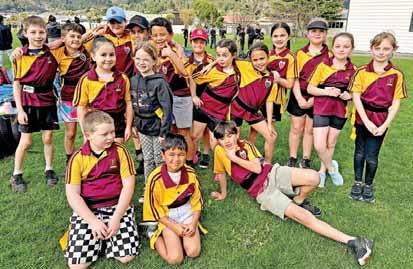
Thevenet School, Pukeatua School and Konini School.





Each school fielded two teams, with six players in each team on the field at a time, and they played a round robin in two pools.
“The focus of the day was around participation,” Amanda says. As a result there were no finals played.
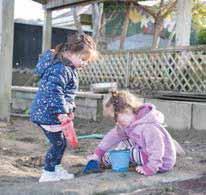



“The weather was amazing and it was good to see the kids active and having fun.”
Wainuiomata Intermediate School not only hosted the tournament, some of their students also refereed games “and they were amazing.
“It was a great opportunity to connect the primary schools with
the intermediate school,” Amanda says.
Moana Kuma from the Wainuiomata Rugby Football Club presented prizes to players as well as presenting a certificate to one member of each team, which the school had named as making a valuable contribution to their team.